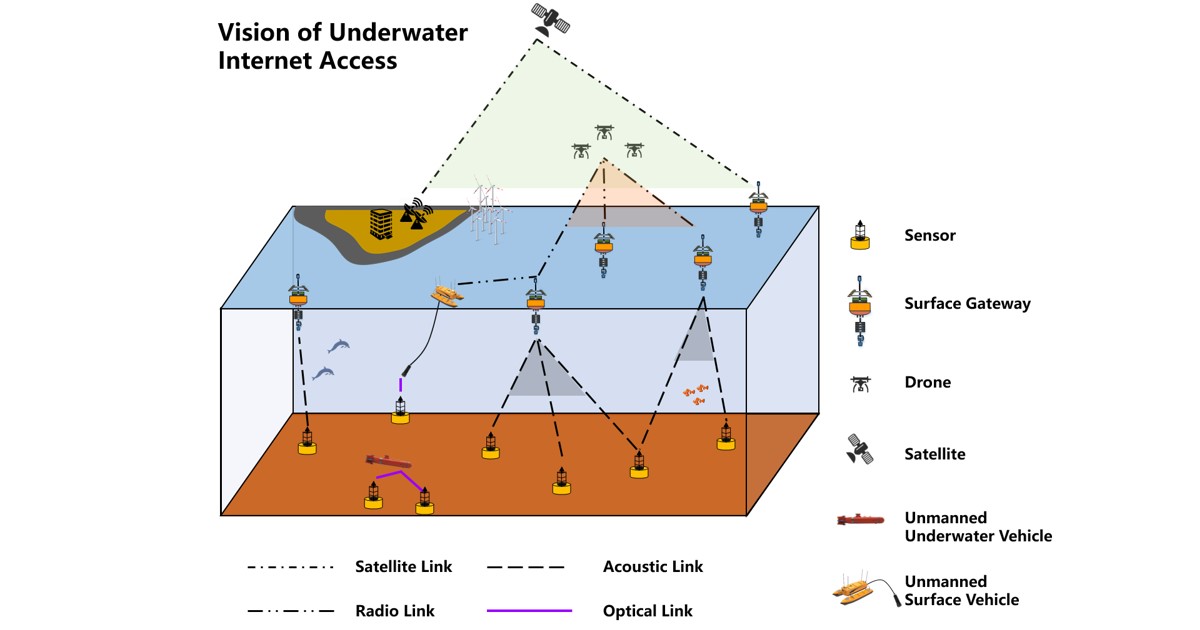Internet of Underwater Things: Applications and Challenges
A special issue of Applied Sciences (ISSN 2076-3417). This special issue belongs to the section "Electrical, Electronics and Communications Engineering".
Deadline for manuscript submissions: closed (10 September 2022) | Viewed by 4240

Special Issue Editor
Interests: underwater acoustic communication; wireless communication; array signal processing; wireless network
Special Issues, Collections and Topics in MDPI journals
Special Issue Information
Dear Colleagues,
The ocean is an important place for human activities such as fishery and maritime transportation. As human activities in oceans continuously increase, the provisioning of high-performance, cost-effective and reliable communication network services in oceans becomes an important research topic. Since radio signals and optical signals do not propagate through long distances underwater, as they suffer from severe path losses and scattering with high frequency, acoustic waves appear to be a good choice. However, underwater acoustic links are significantly different from radio links in certain aspects, such as their low propagation speed, long transmission range, and limited bandwidth. The communication techniques and networking protocols successfully applied in radio networks cannot be directly extended to an acoustic network. Meanwhile, underwater devices are usually expensive and difficult to deploy. Hence, underwater internet access appears to be the most challenging issue in the application of maritime internet.
This Special Issue will focus on key theoretical and practical design issues for provisioning underwater internet access, as well as up-to-date underwater devices. Topics of interest in this Special Issue include but are not limited to the following keywords:
- Reliable underwater acoustic communication;
- Efficient short-range underwater wireless communication;
- Air–water boundary-crossing communication technologies;
- Energy-efficient network protocols for underwater dynamic networks;
- Architecture of maritime internet;
- Underwater sensing;
- Underwater positioning;
- Water surface gateway;
- High-performance underwater unmanned platforms;
- New application scenario of underwater networks.
Prof. Dr. Fangjiong Chen
Guest Editor
Manuscript Submission Information
Manuscripts should be submitted online at www.mdpi.com by registering and logging in to this website. Once you are registered, click here to go to the submission form. Manuscripts can be submitted until the deadline. All submissions that pass pre-check are peer-reviewed. Accepted papers will be published continuously in the journal (as soon as accepted) and will be listed together on the special issue website. Research articles, review articles as well as short communications are invited. For planned papers, a title and short abstract (about 100 words) can be sent to the Editorial Office for announcement on this website.
Submitted manuscripts should not have been published previously, nor be under consideration for publication elsewhere (except conference proceedings papers). All manuscripts are thoroughly refereed through a single-blind peer-review process. A guide for authors and other relevant information for submission of manuscripts is available on the Instructions for Authors page. Applied Sciences is an international peer-reviewed open access semimonthly journal published by MDPI.
Please visit the Instructions for Authors page before submitting a manuscript. The Article Processing Charge (APC) for publication in this open access journal is 2400 CHF (Swiss Francs). Submitted papers should be well formatted and use good English. Authors may use MDPI's English editing service prior to publication or during author revisions.
Benefits of Publishing in a Special Issue
- Ease of navigation: Grouping papers by topic helps scholars navigate broad scope journals more efficiently.
- Greater discoverability: Special Issues support the reach and impact of scientific research. Articles in Special Issues are more discoverable and cited more frequently.
- Expansion of research network: Special Issues facilitate connections among authors, fostering scientific collaborations.
- External promotion: Articles in Special Issues are often promoted through the journal's social media, increasing their visibility.
- Reprint: MDPI Books provides the opportunity to republish successful Special Issues in book format, both online and in print.
Further information on MDPI's Special Issue policies can be found here.





